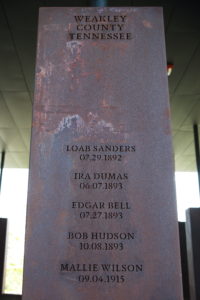
Why Bring a Memorial for Lynching Victims to Weakley County?
WCRP believes that publicly confronting the truth about our history in Weakley County is the first step towards recovery and reconciliation. Bringing a memorial to Weakley County is a unifying goal that we have rallied behind and continue to work towards as a community.
A history of racial injustice must be acknowledged, and our shared local history must be recognized and remembered, before our county can recover from past traumas. Public commemoration plays a significant role in prompting community-wide reconciliation.
The National Memorial for Peace and Justice in Montgomery, Alabama, provides a sacred space for truth-telling and reflection about racial terrorism and its legacy. They have created a monument for our community to move to Weakley county and WCRP has started laying the groundwork to bring this memorial to our county.
There can be no reconciliation and healing without remembering the past.– Member of Community Remembrance Project Coalition in Chattanooga, Tennessee
Please find more information about the Equal Justice Initiative’s Community Remembrance Project here.
EJI : Why Build a Lynching Memorial?
The process of local communities claiming their memorial monuments is thus about much more than transporting and installing the physical monuments themselves. Rather, it first requires an effort to encourage communities across the nation to engage in genuine and sustained work that advances a new era of truth and justice by confronting racial history in a way most communities have never done. EJI’s Community Remembrance Project is one form that work can take, and we are proud to offer our tools and resources to communities interested in using that partnership to advance those goals. Community coalitions who complete community soil collection and narrative historical marker projects, or pursue other, independent community efforts to foster dialogue and remembrance, help raise local consciousness of racial history and help foster dialogue about the connections to contemporary issues and further develop a communal identity that prioritizes historical truth-telling and repair.